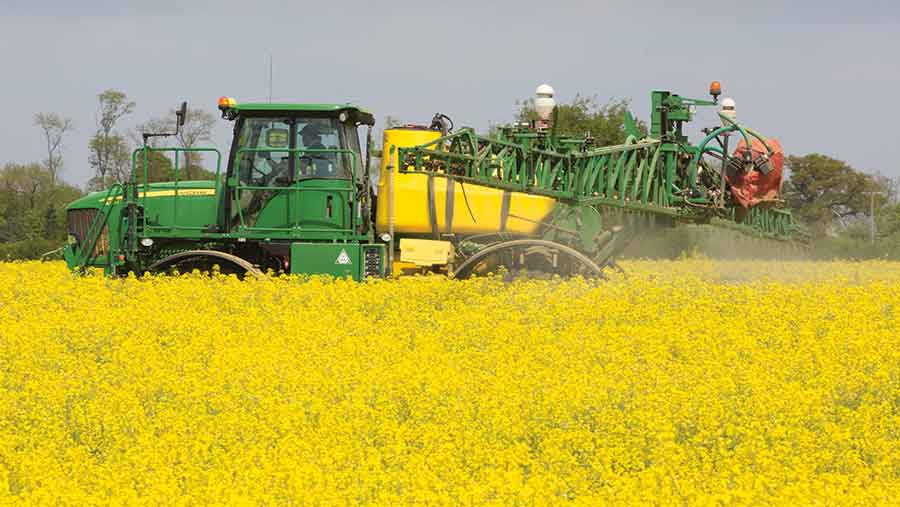Future of oilseed rape at risk amid pesticide threat
 © Tim Scrivener
© Tim Scrivener The future of UK oilseed rape production is under serious threat over the potential loss of crop protection products from the grower’s toolbox, say farm leaders.
The NFU is warning growers that 2017 will be a “big year for EU pesticide regulation” which could mean the loss of several key plant protection products (PPPs).
NFU vice-president Guy Smith told Farmers Weekly that growers may not fully appreciate the looming threat to several key active ingredients used for crop production, which are currently under review by EU regulators.
See also: Beans favoured as replacement for drought-hit oilseed rape
Although oilseed rape margins are under pressure, according to AHDB figures its area will fall for the fifth consecutive year for harvest 2017.
Mr Smith said drought and the loss of neonicotinoids to fight cabbage stem flea beetle were key reasons why growers were already turning their back on oilseed rape.
However, losing glyphosate and key “azole” fungicides could make growing OSR commercially unviable for many UK farm businesses.
Several key herbicides, including metazachlor, propyzamide and carbetamide, used for the control of key broad-leaved weeds and blackgrass in oilseed rape, all face an uncertain future
“Some farmers may think that because the UK is heading for a Brexit, that means we will also be leaving Brussels and pesticide regulation. They are wrong,” Mr Smith explained.
“A trade agreement with the EU could include certain conditions and one of them may be adhering with EU pesticide regulation.
“The NFU is really focused on this area. If we lose any key actives before we leave the EU, the chances of getting them back in a Brexit scenario are not great.”
The fate of glyphosate remains uncertain and its temporary EU licence will come under review again next December. Its loss would have a huge impact on pre-harvest weed control in oilseed rape and establishment of cereal crops.
Several key herbicides, including metazachlor, propyzamide and carbetamide, used for the control of key broad-leaved weeds and blackgrass in oilseed rape, all face an uncertain future.
Threat to diquat
Meanwhile, the threat to diquat, a key chemical used for potato and to a lesser extent oilseed rape desiccation, has gone under the radar.
The EU is also determining criteria for endocrine-disrupting chemicals (EDCs), which could result in the loss of 40 key active ingredients, including important azole-based fungicides. A decision is expected in the summer.
The NFU has alerted Defra to the importance of the UK taking a strong position in Brussels on pesticide legislation.
NFU chief arable adviser Guy Gagen said: “We need our members to lobby MPs and MEPs to make sure they understand why these issues are important.
“Farmers should not be afraid to explain to people in their community why these actives are important and show that they are highly responsible with their use.”
Suffolk-based AICC independent agronomist Robert Hurren said: “The loss of these actives would make growing oilseed rape very challenging to almost impossible.
“It would mean the loss of a key break crop in the rotation. Farmers would have to grow more spring cropping, either pulses or cereals.”

Ed Ford
Case study: Edward Ford, Essex
Grower Ed Ford slashed his oilseed rape area from 280ha seven years ago to 60ha last autumn.
Mr Ford says the crop yielded just 1.7t/ha at Childerditch Farms in Brentwood last season.
“A combination of drought and a loss of neonics meant that anything that did get away was hit even harder by cabbage stem flea beetle,” he explains.
Although the farm is situated near ADM’s rapeseed crushing plant in Erith, Mr Ford says growing oilseed rape on his farm is already unsustainable. Instead, he is growing oats as a break crop this season.
“The odds are stacked against us with oilseed rape,” he says. “If we got neonics back I would consider growing it again.
“But if we were to lose metaldehyde and Kerb (propyzamide), that would be it. Game over.”
‘I couldn’t grow OSR without these products’
Case study: Jake Freestone, Overbury Enterprises

Jake Freestone
Gloucestershire grower Jake Freestone has drilled 160ha of winter oilseed rape at Overbury Farms, near Tewkesbury in the Cotswolds.
For the last two seasons, Mr Freestone has been growing oilseed rape with companion cropping of vetches and buckwheat, which diverts the attention of flea beetle and avoids the need for tackling the pests with an insecticide.
Ferric phosphate pellets are now used in 80-90% of occasions to tackle slugs and applications of metaldehyde slug pellets is kept to a minimum.
However, Mr Freestone says glyphosate is a key ingredient in his no-till system and without it he would have to revert to cultivation, which would impact soil health and water quality, causing more water pollution (runoff) from the land.
Key “azole” fungicides are also essential chemicals needed for control of diseases, such as phoma and light leaf spot and blackgrass.
“Despite choosing a Recommended List variety with the highest resistance to the disease, we used tebuconazole for light leaf spot control this autumn,” he says. “I’m not sure how we would grow the crop without these products.”

